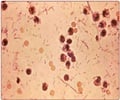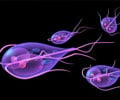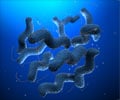What is the pathogenicity of Salmonella infection
The extend of infection of Salmonella species depends on the bacterial type and its strain.
Salmonella possesses two antigens or weapons to protect itself and cause destruction, these include
Heat stable cell wall Lipopolysaccharide known as Somatic or 'O' antigens.
Flagellar or H antigens formed from structural proteins, which make up the hair like filaments from the movement of the bacteria.
After ingestion of Salmonella species along with contaminated food, the bacterium overcomes the body's defense mechanism of gastric acidity.
Inside the lumen of the intestine the bacteria multiplies by attaching to the microvilli of the intestinal surface, which leads to destruction of microvilli through which the bacteria enters the cell.














